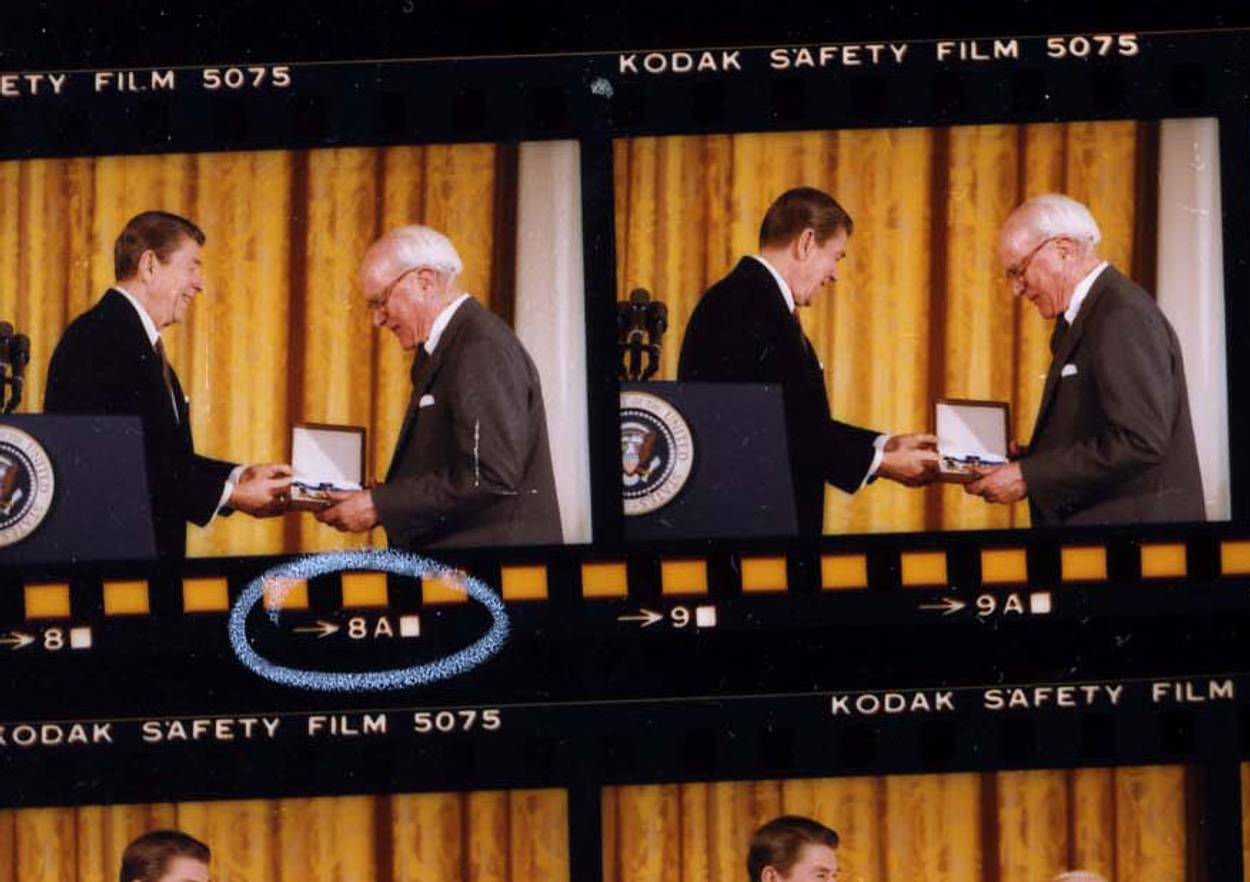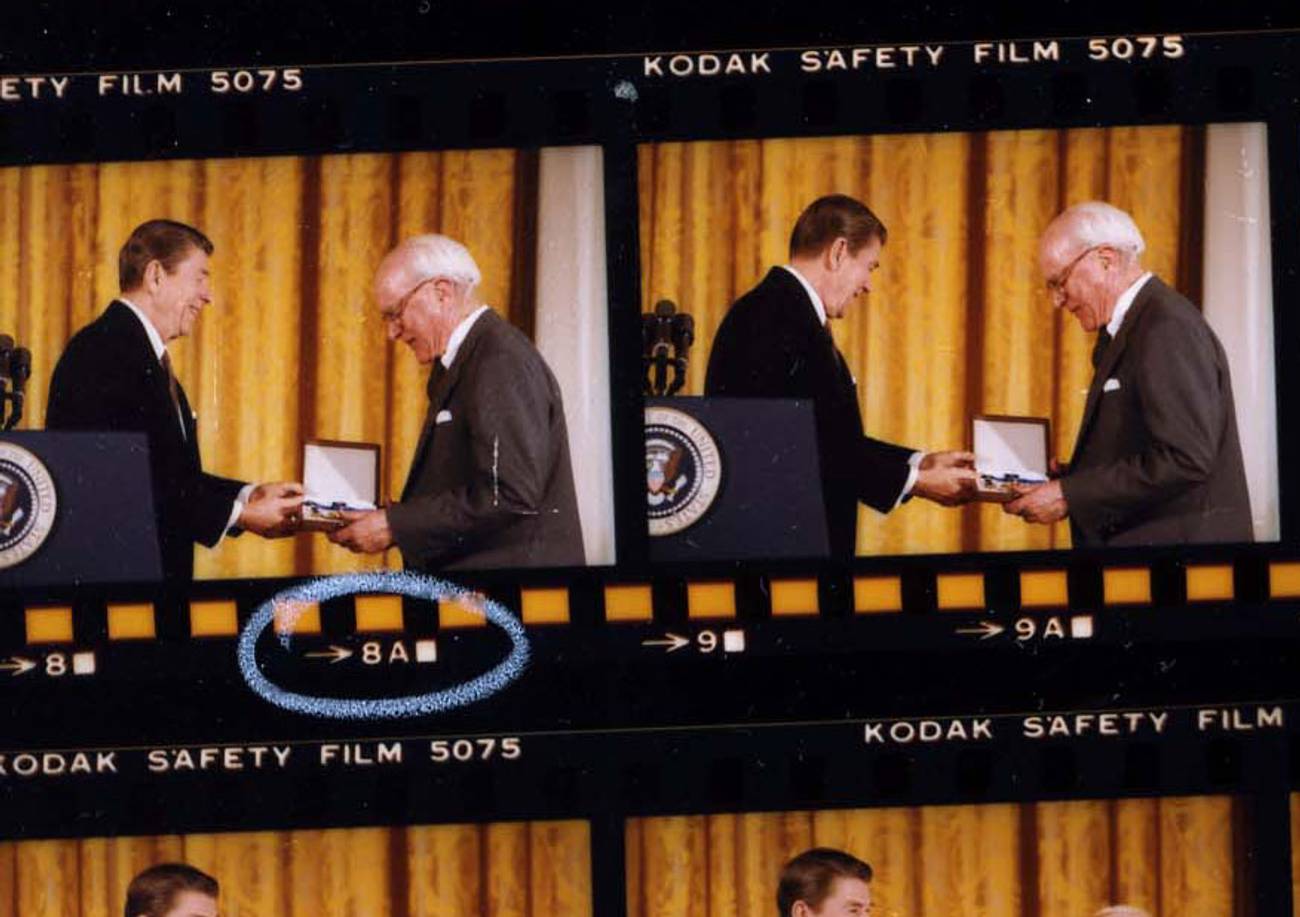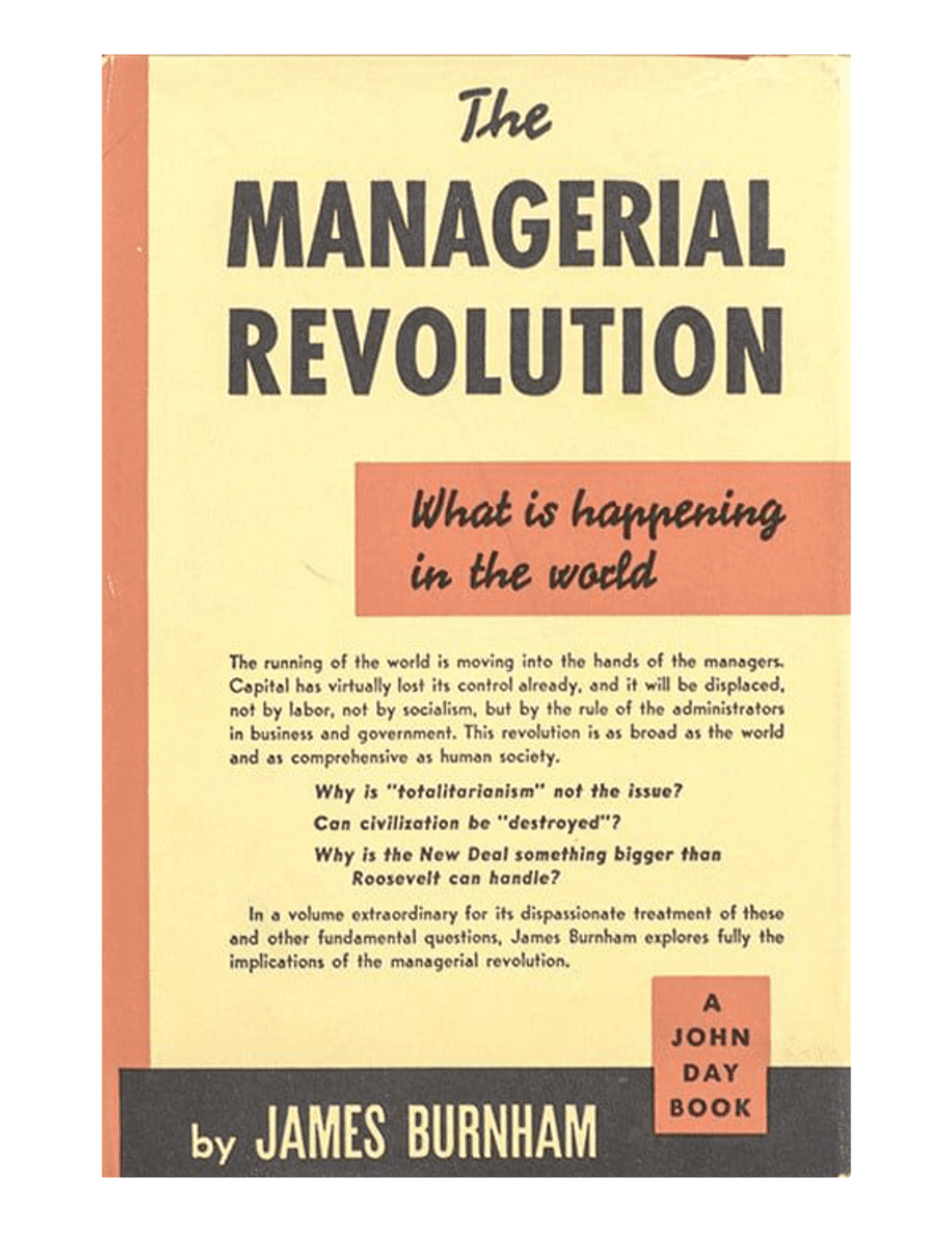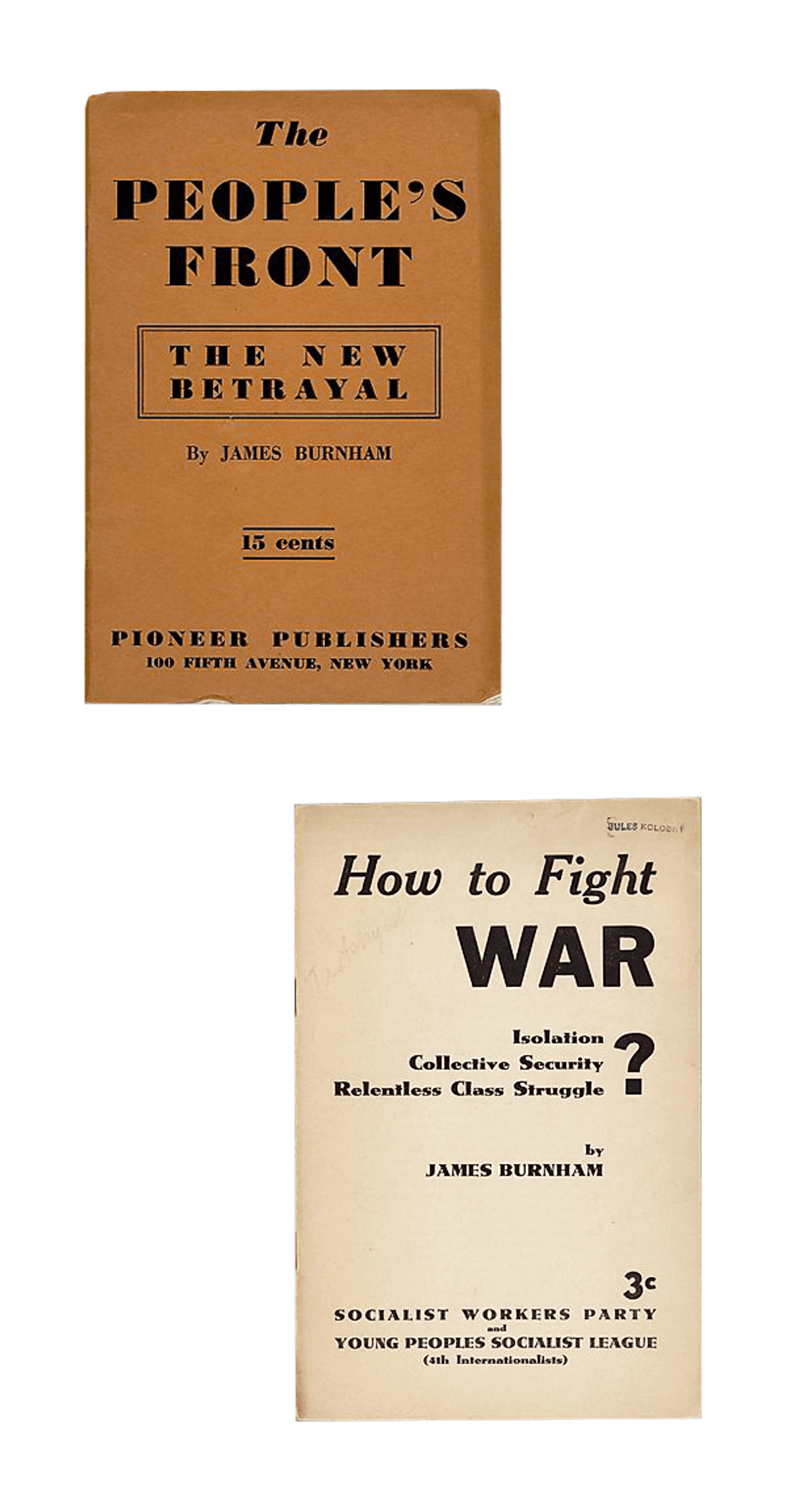The Importance of James Burnham
What a newly rediscovered thinker got right and wrong




Who could have guessed that in the third decade of the 21st century, many conservatives would be discussing class struggle, while most progressives would be determined to change the subject from the American class system to statistical disparities among ever-multiplying racial and gender identity categories? Once uncritical cheerleaders for capitalism, Republicans now find they have fewer friends in the corporate suite; they can only hope to gain political power by appealing to working-class former Democrats of all races in addition to their own shrinking electoral base. Meanwhile, many progressive Democrats have warmed to corporations and investment banks, as long as they censor conservatives, support Black Lives Matter, and hire diversity consultants.
The need to make sense of this realignment goes a long way toward explaining the recent rediscovery of the mid-20th-century American thinker James Burnham, a follower of Leon Trotsky who eventually joined the anti-communist right and then spent the rest of his life as an editor at the flagship Cold War conservative magazine National Review. Born into the affluent family of a railroad executive in 1905, Burnham became a professor of philosophy at New York University after being educated at Princeton and Oxford. In the 1930s he was a major figure in the circle around Trotsky, the exiled Soviet revolutionary. After renouncing Marxism, in 1941 he published The Managerial Revolution: What Is Happening in the World, which became a trans-Atlantic bestseller. In the midst of World War II, Albert Speer discussed a British article about the book’s thesis with Adolf Hitler; George Orwell drew on Burnham’s ideas in building the imaginary world of his novel 1984.
In his essay “Second Thoughts on James Burnham” (1946), Orwell summarizes the thesis of The Managerial Revolution:
Capitalism is disappearing, but Socialism is not replacing it. What is now arising is a new kind of planned, centralized society which will be neither capitalist nor, in any accepted sense of the word, democratic. The rulers of this new society will be the people who effectively control the means of production: that is, business executives, technicians, bureaucrats and soldiers, lumped together by Burnham under the name of ‘managers’. These people will eliminate the old capitalist class, crush the working class, and so organize society that all power and economic privilege remain in their own hands. Private property rights will be abolished, but common ownership will not be established. The new ‘managerial’ societies will not consist of a patchwork of small, independent states, but of great super-states grouped round the main industrial centres in Europe, Asia, and America. These super-states will fight among themselves for possession of the remaining uncaptured portions of the earth, but will probably be unable to conquer one another completely. Internally, each society will be hierarchical, with an aristocracy of talent at the top and a mass of semi-slaves at the bottom.
The Managerial Revolution was inspired by a debate among socialists about how to classify Stalin’s newly consolidated Soviet regime—was it a socialist state or something else? In his pamphlet The Bureaucratization of the World (1939), an Italian author, Bruno Rizzi, argued that Marx had been wrong and that the next stage after capitalism would not be socialism but a kind of bureaucratic collectivism. Burnham had no access to Rizzi’s book, but he read the denunciation of Rizzi’s argument by Trotsky, who argued that instead of a regime of a new kind, the USSR was a “degenerated workers’ state.”
Burnham synthesized hints from Rizzi with the thesis of Adolf A. Berle and Gardiner Means in The Modern Corporation and Private Property (1932) that the growth of large, oligopolistic corporations, run by professional managers and “owned” by great numbers of fluctuating shareholders, had separated ownership from control in the economy, and had replaced personally owned physical assets with the attenuated property of stocks and bonds. According to Burnham, the 19th-century bourgeois civilization based on small firms and parliaments was giving way to a new society whose ruling class was made up of professional managers of giant corporations, civilian bureaucrats, and military officers. The Soviet Union, Nazi Germany, and Franklin Roosevelt’s New Deal America, Burnham boldly claimed, were simply three variants of the modern managerial regime.
As if that were not iconoclastic enough, in 1943 Burnham published The Machiavellians: Defenders of Freedom, creating his own canon of unsentimental thinkers in the elitist tradition of political science and sociology who saw through the religious and secular ideologies that disguise struggles for power and wealth: Robert Michels (the iron law of oligarchy), Vilfredo Pareto (the shaping of politics by instincts or “residues” and ideologies or “derivations”), and Gaetano Mosca (“the juridical defense” or checks and balances), in addition to Machiavelli himself and the French syndicalist George Sorel. The modern Italian school of political realists, including the German-Italian Michels, overlapped with the Italian school of public finance, which later inspired the libertarian economist James Buchanan to develop modern public choice theory. What Burnham and Buchanan, otherwise very different thinkers, both derived from these early-20th-century thinkers—most of them disillusioned leftists or liberals—was the view that politics is largely a matter of mystification and trickery, and that the idea of a neutral state is a myth that serves power-hungry ruling elites.
The Soviet Union, Nazi Germany, and New Deal America, Burnham boldly claimed, were three variants of the modern managerial regime.
Like the late Christopher Lasch, Burnham has enjoyed a posthumous vogue among thinkers on both the left and the right who are dissatisfied with the partisan narratives that shape the discussion of American politics and society. A key moment in today’s Burnham revival was marked by the publication in January 2017 of the essay “James Burnham’s Managerial Elite” in the first issue of American Affairs by Julius Krein, one of the two founding editors of the intellectual quarterly. My essay “The New Class War,” in the May 2017 issue, later published as a book with the same title in 2020, drew on my own lifelong interest in Burnham, who was one of a number of influences on my first book, The Next American Nation (1995). Conservative journalists including like Matthew Continetti and Ross Douthat have also written about Burnham.
As recently as 2011, Grant Havers noted in Telos that Burnham “has attracted the greatest interest in his work from the Left rather than the Right.” Today’s narrowly sectarian left, however, is not interested in dialogue with outsiders and heretics. A typical recent example of progressive intellectual border-patrolling, titled “Nostalgia for Flawed Thinkers Won’t Solve the Crisis of the Conservative Intellectual: The renewed interest in James Burnham shows just how badly Donald Trump has destroyed conservative orthodoxy,” was published in The New Republic in 2016 by Jeet Heer, whose scholarly works include Arguing Comics (2005), A Comics Studies Reader (2008), and The Superhero Reader (2013).

But there is nothing inherently right wing about Burnham’s theory of the managerial stage of modern history. Indeed, it is best viewed as a version of post-Marxist leftist thought, with variants formulated in the same period by ex-communists like Rizzi, Burnham, and the Yugoslav dissident Milovan Đilas. The left-liberal John Kenneth Galbraith acknowledged that Burnham’s theory of the managerial elite had influenced his own discussion of “the technostructure” in The New Industrial State (1967), just as it anticipated Barbara and John Ehrenreich’s later definition of the “professional-managerial class.” Nothing could be further than Burnham’s modernism and realism from traditional European and American conservatism, which seek to base government and society on some eternal standard interpreted by this or that intellectual clerisy: divine commandments, inalienable natural rights, the universally valid laws of the self-adjusting marketplace, or pseudoscientific biological theories, in the case of the racist right.
In the late 1940s and the early 1950s, Burnham was viewed as a maverick member of the trans-Atlantic anti-communist left. To use the contemporary term, he was “canceled” by the left-leaning intellectual establishment when he defended Sen. Joseph McCarthy’s demagogic hearings about real and imaginary Soviet subversion in the United States. He joined the young William F. Buckley Jr. in founding National Review in 1955, where he remained an editor until his death in 1987, shortly after being awarded the Presidential Medal of Freedom by Ronald Reagan.
One might expect that the Cold War liberals and anti-communist socialists who became known as “neoconservatives” in the 1970s and 1980s would have embraced Burnham’s proposed revision of Marxism by managerial theory. After all, his left-to-right journey had blazed the trail that many of them had taken. Ironically, however, like good orthodox Marxists, the neoconservatives rejected the idea of the managerial revolution as a transition from one kind of society to another. For both Daniel Bell, a self-described democratic socialist, and Irving Kristol, co-founders of The Public Interest, small owner-operated businesses and globe-straddling multinational firms alike could be described without qualification as “capitalist” (a term for which Kristol often used “bourgeois” as a synonym).
Bell, who described himself as a socialist in economics, a liberal in politics, and a conservative in culture, was influenced by the economist Joseph Schumpeter, who argued in Capitalism, Socialism and Democracy (1942) that the cultural hedonism unleashed by consumerism would dig capitalism’s own grave and lead to a socialist society. For his part, Kristol rejected the idea of a broad managerial elite and instead appropriated the term “the new class,” coined by Đilas, and later associated with the work of the sociologist Alvin Gouldner, to refer to academics, journalists, and nonprofit activists whose left-wing “adversary culture” made them hostile to “bourgeois” capitalism and traditional “bourgeois” values alike. (Gouldner objected to this use of the term “new class.”)
In January 1978, the 73-year-old Burnham joined the debate in a review in National Review of Alfred Chandler’s study of the rise of managerial capitalism, The Visible Hand, titled “What New Class?” Burnham mocked the neocons for arguing that the “new class” of “intellectuals, verbalists, media types” could be compared in power and influence to “the managers of ITT, GM, or IBM, or the administrator-managers of the great governmental bureaus and agencies.”
Implausible though it was, the “new class” theory allowed neoconservative apparatchiks and other members of what has been called Conservatism Inc. to seek grants from rich libertarian donors and pro-business foundations by promising to prevent the allegedly imminent overthrow of capitalism by left-wing professors and nonprofit activists belonging to “the adversary culture.” Needless to say, Burnham’s view that corporate managers and bank executives are secure at the apex of the potentially oppressive managerial elite was not useful to conservatives in fundraising campaigns.
From the mid-’50s onward, Burnham was treated as an Unperson by the American left. On the American right, Burnham was honored but ignored. William F. Buckley Jr. said: “I would consider him the number one influence on the National Review since the day of its founding.” But it is hard to discern any influence of Burnham’s thought on free market libertarianism or religion-infused traditionalism, two legs of the “conservative fusionist” stool (the third being anti-communism).
Where Burnham did fit in with the conservative movement was in his vigorous support for prosecuting the Cold War. By a sort of law of compensation, the intense emotion and apocalypticism that Burnham sought to excise from his stoic books on political philosophy burst through in his strident Cold War studies like The Struggle for the World (1947) and The Web of Subversion (1954). His column at National Review was by then titled “The Third World War.” Having erroneously predicted in The Managerial Revolution that Nazi Germany and Japan would win World War II, Burnham, like many ex-communist Cold Warriors, consistently exaggerated Soviet power and influence from the 1940s to the 1980s. His anti-communist zeal was so extreme that the CIA reportedly cut him off as a consultant.
Burnham’s anti-communist zeal was so extreme that the CIA reportedly cut him off as a consultant.
In 1959, Burnham wrote Congress and the American Tradition, the last of his three books that deserve to be read today, along with The Managerial Revolution and The Machiavellians. In Congress and the American Tradition, Burnham presented his fullest account of the need for what Mosca called the “juridical defense,” defined as checks on the power of the managers:
Within the emergent managerial society the typical political form links a huge, pervasive governmental bureaucracy with a Caesarism-tending political leadership sanctioned by mass plebiscites. This combination, supported by a bureaucratized military and police apparatus, operates primarily through administrative decree while using an assembly as recording device and sounding board.
Burnham notes: “Calling in his first annual message to Congress for the replacement of the Electoral College by a direct presidential plebiscite, [Andrew] Jackson stated the classic democratist case against intermediary institutions.” As another example of “democratist Caesarism,” Burnham quotes Woodrow Wilson:
The President is also the political leader of the nation, or has it in his choice to be. The nation as a whole has chosen him, and is conscious that it has no other political spokesman. His is the only national voice in affairs. Let him once win the admiration and confidence of the country, and no other single force can withstand him, no combination of forces will easily overpower him …
Hail Oval Officer!
“The people cannot be represented by or embodied in a single leader precisely because of the people’s diversity,” Burnham observes. “Their representation, if it is to be more than a masquerade, must have some sort of correspondence to their diversity.” He asserts that the decline of the American state governments means that Congress was the last “great intermediary institution between the people and a chief executive evolving into the plebiscitary leader of the masses.”
Ironically, while today’s progressives seek to distance the Democratic Party from Jackson, slaveholder and tormentor of the Cherokee, they also embrace a Jacksonian theory of simple majoritarian government by favoring abolition of the Electoral College and the filibuster. When the Democrats control the White House, the center-left supports dubiously constitutional rule by presidential decree, such as President Barack Obama’s executive orders rewriting U.S. immigration law, and Biden’s order extending a temporary eviction moratorium in the wake of the COVID-19 pandemic.
To younger generations on the mainstream right, Burnham has been best known for his worst book, Suicide of the West (1964), an incoherent jeremiad by an embittered, aging author (he was 59). In the book, Burnham exchanged his theory of the managerial revolution for a Spenglerian vision of civilizational Untergang that began with World War I and was accelerated by post-1945 decolonization.
What has made Suicide of the West popular among several generations of the sort of American conservatives who enjoy “owning the libs” is Burnham’s identification of a caricatured “liberal syndrome” by means of a “test” of 39 questions (here Burnham, whose father was British, evokes the 39 Articles of the Church of England). Burnham writes: “A full-blown liberal will mark every one, or every nearly every one, of these thirty-nine sentences, Agree. A convinced conservative will mark many or most of them, a reactionary all or nearly all of them, Disagree.”
Nearly a quarter of the questions, including the first, refer either to the contemporary civil rights movement in the United States, or to the global wave of post-European imperial decolonization abroad. Like his National Review colleagues who defended segregation in the United States and apartheid in South Africa and Rhodesia, Burnham evidently saw Martin Luther King Jr. and Kwame Nkrumah as part of the same assault on a retreating Western (read: “white”) civilization:
1. All forms of racial segregation and discrimination are wrong.
14. Colonialism and imperialism are wrong.
15. Hotels, motels, stores and restaurants in southern [sic] United States ought to be obliged by law to allow Negroes to use all of their facilities on the same basis as whites.
20. All nations and peoples, including the nations and peoples of Asia and Africa, have a right to political independence when a majority of the population wants it.
27. In determining who is to be admitted to schools and universities, quota systems based on color, religion, family or similar factors are wrong [Burnham, a Princeton-educated WASP, is referring to the anti-Black and anti-Jewish quotas of the Ivy League and other universities at the time].
28. The national government should guarantee that all adult citizens, except for criminals and the insane, should have the right to vote.
32. Everyone is entitled to political and social rights without distinction of any kind, such as race, color, sex, language, religion, political or other opinion, national or social origin, property, birth or other status.
The racism implied in Suicide of the West was built upon by Samuel T. Francis, one of the few intellectuals on the right who was influenced by Burnham before the more recent revival. Explicit white supremacy is absent from Francis’ summary of his monograph Power and History: The political thought of James Burnham (1984). Around 1988, I, a young Cold War liberal-neoconservative at the time, had lunch in Washington, D.C., with Francis to discuss Burnham, whose managerial theory intrigued me. With a chuckle Francis referred to himself as “a fascist,” pronounced the Italian way, “FAH-shist.” I assumed he was joking. When the subject of immigration came up I pointed out that Mexican Americans were assimilating and intermarrying at the same rate as European immigrants had in the past, so that while there might be economic consequences of unskilled immigration from Latin America, it was not a threat to the continuity of American culture. Francis glowered and said emphatically, “They are not our race!”

Appalled, I had nothing more to do with Francis, and I was not surprised when, a few years later, he was fired by the conservative newspaper The Washington Times for giving a speech calling for white racial nationalism at an American Renaissance conference. In 2016, Radix published his unfinished magnum opus, Leviathan and Its Enemies. In that book, Francis turns Burnham’s passing discussion in The Machiavellians of Pareto’s clever but mechanistic theory of politics—a cycle in which weak but cunning “foxes” are succeeded by strong and simple “lions”—into a sustained argument for replacing America’s “soft managerial regime” with a “hard managerial regime” devoted to “the exclusion, defeat, or destruction of alien or disruptive forces that threaten, exploit, or retard the identity of the race, class, or culture that is the core of social solidarity.” FAH-shist indeed.
Despite the racial prejudices he shared with most of his generation of white Americans and Europeans, it is hard to imagine Burnham—an advocate of the juridical defense, an opponent of Caesarism, a pragmatic Republican who thought Goldwater and Reagan were too extreme, and according to his biographers a suave bon vivant—embracing Sam Francis’ vision of a Spartan white nationalist “hard managerial” regime, with its post-bourgeois proletarian squadristi recruited from the body-building acolytes of the alt right.
What remains of value in the thought and work of James Burnham, when the ephemeral and idiosyncratic have been dissolved by the passage of time? If Burnham’s personal racism, manifest in Suicide of the West, discredits his earlier theory of the managerial revolution, then Jefferson’s pseudoscientific racism means that natural rights liberal philosophy must be abandoned as well—along with Marxism, of course, because Marx asserted in his essay on the Jewish question that “The bill of exchange is the real god of the Jew” and asked, following the conquest of Mexico by the United States, “Is it a misfortune that magnificent California was seized from the lazy Mexicans who did not know what to do with it?”
Nor is there anything particularly conservative about Burnham’s critique of plebiscitary Caesarism or his defense of intermediate institutions against the overweening power of managerial bureaucracies. At the moment, the American center-left is dominated by an alliance of cultural progressives and economic neoliberals who embrace centralized government, “woke” corporations, banks, and cultural bureaucracies as equally useful instruments of social engineering. But at other times in American history, as in other countries, liberals and leftists have favored decentralization and viewed localism and legislatures as bulwarks against tyranny and faction. In the 21st-century United States, I believe it is necessary to rebuild some modern versions of the extragovernmental intermediary institutions—autonomous local political parties, organized labor, and organized religious communities—that served in the past to provide “countervailing power” (Galbraith’s term) against arbitrary rule by the college-educated managerial elite that staffs and controls most public, private, and nonprofit bureaucracies alike.
Notwithstanding its current revival, Burnham’s thinking about how to preserve liberty and pluralism in an age of managerial bureaucracies is likely to be as limited in its influence today as it was in his lifetime. Center-left progressivism portrays politics not as a power struggle among opposing interests, but as a holy war by idealistic altruists in favor of environmentalism and race and gender “equity” against opponents who are ignorant, irrational deplorables. It is possible, perhaps likely, that populist conservative politicians and pundits may come to use the term “managerial elites” to mean only the left-leaning Democrats who dominate the civil service, K-12 teaching, universities, and the mainstream media, while remaining silent about their own billionaire corporate backers. If so, these Republican politicians will be in the tradition of Irving Kristol and other opportunistic neocons who posited a battle to the death between “the new class” and “capitalism.” Burnham’s contrast of “democratism” with constitutional government is as incompatible with the cult of the populist demagogue Donald Trump as it is with the high-handed religious fervor of today’s progressives.
As a realist, Burnham would not have been surprised by the continuing rejection or misuse of his major ideas by politicians and ideologues of right, left, and center. Along with the disillusioned European thinkers with whom he identified, he believed that most political actors adopt ideas not on the basis of their truth but on the basis of their utility. Yet Burnham was surely right in Congress and the American Tradition that in a constitutional design for a large, diverse, and complex society, “the deeper effort may be to get as close as possible to a voluntary agreement or consensus rather than a majority, to seek a political result that will be reasonably satisfactory to as many as possible, even all …”
Michael Lind is a Tablet columnist, a fellow at New America, and author of Hell to Pay: How the Suppression of Wages Is Destroying America.